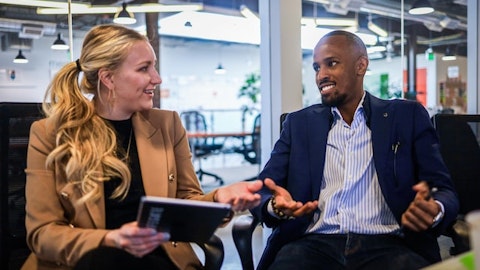That’s something where our marketing platform could be helpful, even though we’re not in that business. I’m not saying — we’re not looking at any business like that. But that’s an example of something that’s not in our core business where we would probably take a long hard look at. But I can also tell you though, as it relates to our core businesses, we have to figure out what we’re doing strategically in an ever-changing environment. How do we get some advantages, some scale advantages, some programming content advantages in our TV business? The radio acquisitions that we’ve made were very synergistic because we’re consolidating in markets. So, I think, you got to continue to look at how do you fortify those businesses as the ecosystem continues to change, because we’re going to be in those businesses, right?
And so, you got to figure — we got to figure out how to flourish. But we try to be really careful about what we do. I would say that our number one priority is — it could be in a defensive posture from the standpoint of making sure we continue to delever. And if we can get an opportunity where we think we can earn a 20% return pretty confidently, then, we’ll take a hard run at it. The casino investment, even though it didn’t — it didn’t pay back for a while, we’re pretty confident that if we spent $560 million building it that it would return a $100 million of EBITDA, and we would get that kind of return, based on what we knew about the central Virginia market.
Unidentified Analyst: Got it. And so, you just touched on this, but you’ve mentioned in the past that you’re looking for efficient — opportunities to achieve more efficiency on the — in the linear television business, given the challenges there with sort of melting subs. So, how are you thinking about that?
Alfred C. Liggins: I don’t have the answer yet. We were one of the four or five parties that were interested in the BET Media Group when it was being shopped in a process. We made an offer. Our offer was not at the level that Paramount wanted to transact at. And I don’t — evidently nobody made an offer at that level. That’s the reason they stopped the process. But there would’ve been a great deal of synergy there from a programming cost standpoint, advertising sales standpoint. And so, we looked at that. Quite frankly, we also then kind of just pivoted our attention to this Richmond referendum. And yes, that election was November 7th, and now it failed. So we’re now coming up for water — I mean, excuse me, coming up for air.
We’re in the middle of doing our budgets for next year. We haven’t — we didn’t have the bunch of M&A idea projects just sitting on the sideline that we were considering simultaneously, as we were doing the — during the referendum effort. And so now, we’re getting our budgets done, look at paying down some debt and then figure out what the opportunities are. So, that’s — so there’s nothing on deck this moment.
Unidentified Analyst: Makes sense. Maybe just a higher level question. You have four different classes of shares. I think that when you’re looking at the overall capitalization of the business and declining multiples in the core businesses, the enterprise value multiple, and it’s tough to even see what those are in the space right now, given all of the stress across some of your peers. You guys are in a pretty nice position relative to them. But how do you think about that? I mean, is there value in having that sort of controlling voting shares or do you think that you could potentially achieve a higher valuation where you just to — collapse those to just one share class and simplify that? Like, is that a remnant of maybe a prior outlook on the world or is that something that you view as important going forward to have that sort of four different share classes with different voting rights?
Alfred C. Liggins: Yes. So look, you say does it have value? The answer is yes, it does have value, particularly in this environment. We are a minority-certified, African-American controlled company. At times, we’ve been African-American owned, which is also a different designation because identifiable African-American ownership has been over 50%. The family controls about — owns about 50% of the economics of the Company. But we’ve benefited greatly from the minority certification being out there, and we’ve been certified for a long time. So, I do think that there is absolutely value there. There are lots of companies that want to do business with minority-owned companies and minority-controlled companies for their diversity efforts.
But here’s what I can also tell you. If we flattened the share structure and had one class of shares, I’ve got zero confidence that investors are going to pile into our stock and give us any sort of multiple uplift. It’s just not going to happen, right? I am not seeing it in any companies across the sectors that we’re in, whether it is radio companies or whether it is cable network companies. I don’t think the mid-single-digit multiples of radio and cable television programmers has anything to do with their share structures, right? It has everything to do with people’s view on those industries.
Unidentified Analyst: Okay. That’s interesting. I mean, I just think from a defensive stance, [Technical Difficulty] while the equity multiple may not be explosively higher on that alone, I mean, there’s been a lot of research on discounts for controlled businesses. And when you are a levered business that people are looking at LTV, I would think you’d want to do anything you can to keep as much cushion as possible. And then, lastly…
Alfred C. Liggins: Yes. I mean, we create cushion by paying down our debt or issuing equity. And we’ve never had any problem issuing equity. I mean, we don’t have them in place now, but in the past we’ve had our ATM programs into place and — in place. And I forgot, was it ‘20 or ‘21? I forgot. It was one year — no, in ‘21, fairly active issuing. I think we issued almost $50 million worth of equity. Yes. When our stock got some significant lift from being a African-American focused and controlled company because of the whole sort of mean from — there was a moment in time wherein our stocks, companies like ours were running. We took advantage of it. And so, if we need more equity capital, we are willing to issue shares to give ourselves more cushion.

